Episode 5
Mark “Henry” Lawson
Hear about our latest Veteran of the Day, Mark “Henry” Lawson
Speaker 1: I'm Steve price. I'm proud to be an Australian ambassador for wounded heroes, the first responders to our homeless and at-risk veterans providing emergency solutions right across Australia. They're starting to sell furniture and they're starting to sell engagement rings. They're Hocking their metals. They're Hocking the play stations for their kids to keep a roof over their head. A year round wounded heroes provides these emergency solutions with no government funds. We just noticed there was a need for that immediacy of crisis funds, immediacy of being able to operate within one hour, 10 minutes, 15 minutes to get food on the table, electricity to get some rent pays. They're not being evicted. And they saved my life now and they work tirelessly seven days a week without any help. You know, they're running on the smell of an oily rag and they, they get they're unsung heroes. Oh, veteran of the day for this week for winded heroes, the organization that we're so passionate about trying to raise awareness for is a bloke by the name of Mark Lawson.
Speaker 1: Now, given his surname, of course, he has attracted the nickname of Henry after the famous Australian Bush poet, Henry Lawson. And when I look into the background of what Mark Lawson's done, uh, outside his military career, he could have almost been Henry Lawson himself. Given he's been a, a slaughter man. He's worked as a butcher, a Shira I'm told he's been a timber filler. He's worked on mine sites and famously of course, Henry Lawson went on his trip through Outback, new South Wales and Queensland to raise awareness of what it was like out in the Bush, particularly during the depression Mark, Lawson's on the line. Great to catch up with you if you always had that nickname.
Speaker 2: Ah, thanks. Thanks. Yeah, absolutely. Yeah. So when I was eight and we did pro poetry in primary school, I got the nickname Henry and it stuck ever since I would think it's been a lot of fun because it's not my real name, but that's all people, me as a lot, a lot of the peoples. And it sort of bit me in the a couple of times where the investment in a wedding and I went to sign the certificate of marriage and Henry Lawson on there. And then I've had to fork out about $250 for new one because the broad gracefully requested a 24 karat gold leaf all around outside. So it's cost me a penny here and there. Um, in the, uh, Brisbane court that I've had checks written out the Henry laws and even when I was sharing it, uh, so it's, it's a bit of a, uh, conversation. Every time I get introduced,
Speaker 1: Made a look up, uh, I know, I know a basic working history of Henry Lawson, but I prompted me to have a look back at what he did. And, uh, he's described as a, a proud nationalist and a Republican. Uh, he's one of those guys, uh, that has just had such an impact on, on Outback Australia, which I know is a particular part of the world that you love yourself.
Speaker 2: Yeah, absolutely. Um, well, Henry Lawson, I don't know if we're related, but I think the way our laws, uh, were related, he was, uh, it was a great poet and tell a great story and, and, uh, it goes up a couple of days, more stories improved and the, um, the, uh, he was a drunk that will live from my chest to my chest. So I do that as well. I don't don't as much, uh,
Speaker 3: Did struggle with the grog a bit. He struggled with, uh, with, with depression and mental illness and, you know, he didn't always do it easy and he was, you know, he's got sack from plenty of jobs. I mean, he's a, it's a classic Australian character from that time. Really?
Speaker 2: Yeah. This is very similar story. Um, the, uh, and again, all of a sudden, every solo girl, wasn't, uh, wasn't as good as some of the people that are on practical nights. Um, and, but I think in the Outback, I love the Outback, like grew up in that farm. Um, and I've always been drawn back here. Uh, and, uh, as a, as a proud Australian, you know, I was in the spirit and intent of everyone working on the same sheet of music, or I think we, we need to be proud of Australia and, and not focus on, um, uh, some of the things that I think are dismantling the spirit of the community and things like that, uh, because people are wishing them, what's in it for me, me, me, me, me, me, and I don't know, I don't think there's enough articulate leadership in positions that can bring everyone together as opposed to separate them apart.
Speaker 2: Um, and I think, uh, uh, well, Australia, you know, I was born here, uh, obviously, you know, a very strong connection being in the far North. I've got a lot of Aboriginal, uh, Mike's and family. Everyone's got relatives, but not everyone's got family, even the relatives sometimes are not family. You know what I mean? So, you know, I've got some very close who I'm going to catch up with that. I actually used to work in the prisons. He was, he's a big, strong, black color. Uh, we're very close. Uh, I couldn't get his 70th, so I'm sort of glad I'm here to catch up with him. He's a, he's a very, very good man, very good family, man,
Speaker 3: That you're a military career in a moment. I just want to, on that theme when you're serving in the, uh, in the Australian armed forces, um, how much of that is that you are doing a job for Australia as well as doing something as an individual?
Speaker 2: Well, that's a bloody good question. I think it's each, because if you it's the foundation of why you're there, it's the foundation, you know, th that, that spirit of Australia representing a country is the foundation of everything you do. And I think, uh, because of the absolute, um, the pace of the unit I was in SAS was, um, it's very, you gotta be back to, uh, you know, the foundation of why we're there. Um, because everyone wants a career. Everyone must succeed highly competitive. You know what I mean, as good as you laugh at all, you know, cause you said earlier that it's always standing good standing editive manner to lift you up, not put you down. So, um, so like that, you know, when you wear your heart on your sleeve, it's to do a good job representing your country, not when you're getting feedback, that's when you put your heart off and put it back in your pocket, and then you get your notebook out and say, sorry, in the spirit of representing your country, it's definitely foundation's favorite present the speed and the top of top, some of the danger, um, and some of the very, uh, here would you say, very detailed tasks and planning and execution of very dangerous, uh, things that you do even in training you're, um, you know, you tend to think about self, getting the job, getting the job done well.
Speaker 2: Um, and, uh, um, and then in reflection, you're back representing your country, even though you are at the time, it can get a little bit to where you've got to chunk down into detail, um, into, uh, uh, uh, point of view than a viewing point that you brought up. So it's really good question. I'd love to think about that.
Speaker 3: You let SIS roll off your tongue. We'll get to your SAS career in a moment. I think you joined them at 31, but let's go back to why you chose Mark to go into the military in the first place. How come?
Speaker 2: Uh, well, uh, it's, uh, not a great question. Um, well, my dad passed away when I was 15 and August. I relied on a lot of his mates there, a bit of alpha male on if that's what you want to call it. Um, but I needed the man hit if you know what I mean? Um, and, uh, um, the last that one of my birthdays, they asked me what I was going to do if someone 74 grew up and when I grow up and, uh, um, I wanted to be a Shearer cause it was a grind Australian. And I would think they very hard working. It's very honorable and I want that life. I want to be, I want to be proud of myself and other, my family prayer. I mean, the other thing was to be a soldier because, um, my grandfather was in how many Guinea mobile too.
Speaker 2: Um, and he didn't talk much about it, but what he did say, well, I just love and, uh, uh, really fell in love with she's three. So they're the last two things my father knew I was gonna do it at 15. So that was two things I had to do in Milan guy shearing, or had to get 200 because people are sharing with me quite quick and I didn't want to get it back right after batting or on the moot brush. So you had to pull your finger out and do a good job, but so we got to do shearing and with soldiering, I wanted to be a soldier and I loved it being a country boy. And, um, of course I wanted to be as good as I can in that field. Um, and I think given, uh, the quality of, of soldier, uh, in the unit where a, when, um, uh, also, um, um, so I did get, uh, I w uh, could, um, but all I could see there was lots of room for improvement.
Speaker 3: You're being far too modest and too humble. I think, I mean, I'm sitting here in my study and I'm looking at a photograph of my uncle who was one of the retro to Brooklyn, ended up in new Guinea and I've got his metal sitting there next to a photograph of him. Uh, how much of your family history in tossed you to, to go and go into the military and then obviously serving combat?
Speaker 2: Um, I would always Mr. Ford, the hell strongly as people. Ah, you know, um, uh, the people that served when I was a young fellow, I just, I was amazed and, uh, at the courage point for him father, because there was so many online, I looking at him, uh, I didn't know, uh, you know, what sort of battles he was in or, uh, all sorts of things. And it slowly come out. He was a flight Sergeant. Um, so he's working on the planes and to me, it's in front of him. I said, Oh, I thought you were soldiers shot these people. And he goes, Mike, he said, uh, it's, uh, that that's tough yards, not many survivors out there on the Hill, in the Hills. He saved them. We would get them troll to get, um, aircraft pots to keep kitty hooks flowing. And the other things like that.
Speaker 2: And quite often we, you know, we had to beat the Japanese. So whenever there was a babe profit, Shelby's what I can to keep things going in the air. So I, when I saw it from that point of view, I said, Oh, that's pretty. Oh, hell yeah. Uh, so from that point of view or sort of, it really influenced me a lot to be what my grandfather, you know, um, and, uh, so that was a lot family. Um, we, we had a fairly normal family, uh, government workers, um, nothing too flash want to flash. I mean, nothing out of the ordinary, very community people. Um, you know, the family was very close and all the sort of, a little bit of a throwback or, uh, not the black sheep, but, uh, certainly straight from the flock of hell more family lived. Um, and when, when you mentioned Morrissey, I need to shave a few good things.
Speaker 2: I'm pretty proud of, but at the end of the day, um, there's some very good soldiers, very good leaders, very good communicators, very good decision-makers that, uh, really, uh, are really respect. And, and still, when I left doors, I want to move to be more like them, you know, your mentors and, and those sorts of things, how you grow your own ability. Um, I think I grew up a bit too late actually, or I was certainly, uh, not, not, not, uh, uh, I've made a few judgment calls, um, but I think in the heat of things and, and the pace of things where we're only human, we're not computers and even computers shoot themselves every now and then. So
Speaker 4: How hard was it to the SAS?
Speaker 2: Well, I was, uh, I was working in the prison seat and, um, and I was a reserve 10 27. And, um, and it was one of the one officers, uh, that was here, the training work, uh, he was inspirational when he was a snorkel with six RAR and he ran some amazing training and everyone was commenting and how we've never done this before. This is great. And, um, his name's Dave Weinreich, um, when he knows he's he's he's, um, the CEO, his name was Tim Mullen, yay champion. He's got a work ethic and a half, he was working 20 hours a day in Iraq. He wore me out and I'm, I'm used to being out late at night and all those sorts of things. Uh,
Speaker 4: I've interviewed, I've interviewed him dozens of times. He's a great man.
Speaker 2: Yeah. So, uh, periodic right speech, one of the one star generals got promoted under him because of the, how many kicks in the he got. And, and he's the change of the DHL and his family hiking because of the fine poles that he would make a hygiene, Nolan or height. This the too bloody is too hard on us, blah, blah, blah, blah, blah. But, uh, uh, he is at the end that I would not be the man today and I would not have the job I'm getting today. And my family wouldn't be this happy to die. If you didn't continually seek your size 13 shoe, or somebody thinks it needs to fit both more fate in it. Um, uh, uh, um, any appreciate it. So, um, that's the kind of influence, uh, Jim has one on generals. So, um,
Speaker 4: You set your rates, you set your sights on the SAS, um, only the best get in. How did you get in?
Speaker 2: That's funny. Uh, I got, I had no idea it was going to run. Um, no, it's pretty good. And, uh, I, um, when I got there, like I'd been on the 13th, well, I thought, well, if I'm a charity, they've given me a crack, you know, they'll give me a few days and Sandy ride, you know, uh, but, uh, uh, funnily enough, I didn't do too bad. My navigation was good. Um, that was, that was a savior. And, uh, even then, um, or had to go on an emergency procedure, like I didn't make the RV. Uh, and, um, I had a very, uh, brilliant soldier, uh, has a Vietnam veteran and he, he bettered for me. So that was a strike one, but I was still there. Um, and, uh, there was several other things that occurred that I thought, well, this is it. And, um, I woke up one morning and there was a hate gone around me.
Speaker 2: And I went here, wait one was finished and finish, and I give you food, but eat it. Cause it gets checked on the way back when you get in. And then, uh, uh, just really tough stuff. So I think one of the benefits was, I didn't know what was going on and I just resolved to we'll, I'll do whatever I need to do. I'll just do is unfold and, uh, ritually, anti-inflammatories the whole tone, um, uh, knees ankles back. My feet had like the pads coming off and one night, Roy, uh, uh, he had the, you could see the bone on each foot. And, um, uh, and I looked at him and just went, how did you, we just, we, we finished with a stretchy carry that went for about 20 Ks through saints. Then he, and he took his, he took his boot off before we did that. And that's when I saw it. And he was in more training and I was just amazed and totally, uh, motivated because I thought, well, on our own feeling, I can't imagine how that must be. So, uh, um, it was things that you see along the way, these incredibly courageous, uh,
Speaker 4: Come on, dude. That is that mind over matter? I mean, that that's ignoring intense pain.
Speaker 2: Absolutely. That's a really good question again to this. Um, the, uh, I think it is, it's about, uh, mission focus and it's what you love, it's, it becomes totally essential to you and how you feel about yourself. So it is a personal,
Speaker 2: Absolutely. Um, so you need many it's, it's layered, you think, uh, one your reputation to, uh, if, if I stop is only nine or eight or seven left in the team, um, to do, to achieve the same mission with the same, you know, dragging the same, big metal objects through the sand. Um, and, uh, um, you just can't do that. It's not in you Mike, to do that. The other thing is, um, uh, that you disassociate a form of disassociation. I didn't know this, but after I sort of read a little bit and, um, you just, you, you, you got a hundred percent hits. You feel your Headspace with what you have to do. One more tree. Okay. One more tree. Okay. One more tree, you know, and that sort of thing, as opposed to a hundred percent, the head space going on, you can see the bone on my shift, you know, so you bring about what you think about, and if you think about success, you bring about success. And if you think about having a cyst with the bone sticking out, or you can see the bone and that's all red, then you're going to bring up the up, um, the pain that's associated with that and the failures, if you think about it. So I think, uh, um, are the two words put together as thinking about, um, uh, as these incredible bloody man, um, uh, is you bring about what you think about, and I think that sums it up pretty much, you know? Um,
Speaker 3: Well, I think you've summed it up very well. I mean, the fact that you were a pretty good shot, didn't help someone tells me you were the best shot on that sniper course when you joined.
Speaker 2: Yeah. Yeah. Yeah. There's a funny story to that. I'll usually tell everyone I went in and put with a pencil the night before and put all was in the target, but, uh, um, I, um, I grew up in the country and short a few rabbits and things like that. And I really, uh, I think very good instruction, um, and a lot of applied science to the whole thing, which helps them. I mean, anyone better than all of us, he's brilliant and, uh, on and a hell of a Haley family. Um, but he's very, he's just very, very good. Um, but with that, boy always had issues with my eyes. So I got, I got, uh, the trophies when I'm on the front seat. And about a year later, I had my eyes, um, uh, a bit down the mall and I hear the County after the handful of wait. I took them off my eyes with Dustin and, um, uh, I just noticed that, uh, wasn't quite still getting good results. My comfort level was a little bit different. I think
Speaker 2: Once I was meant to go back 2002. So, um, uh, and we went at a time where there wasn't a whole lot of activity. Um, uh, at the same time, you know, we had things like, um, uh, we pulled up in a village and they didn't know who we were, and we saw all these tanks and all that on the side of the road as we went up and it was sort of the [inaudible] bowls on a bulldog hanging on a bulldog. And he said he you're out there for weeks to get people to get, but over all days, um, and I think the longest patrol was about 50 odd days. Um, we were about three, three to four weeks here and there. Um, but, uh, uh,
Speaker 2: Yeah, it's, it's a beautiful consequence that anyone that wants to leave really, because it's just unique place. Um, of course you want to come home, but, uh, uh, it's incredibly tough. It's hardly any fuel for fires. Um, and they, they picked brass to stay warm at night. Things like that. It's 7,000 feet above sea level. So you got snow. Um, and then there's extreme heat and flooding because hardly any trees just rock the ground. The whole face has been lived off of for so long that there's not been a lot of regeneration, but one of the villages we went to, um, um, they gave us apples, apples, and the head seriously had a really, really advanced, um, uh, I guess farming system for orchards
Speaker 4: That agriculture it's probably because of it's soil to rank so tough that if you can grow something, it actually it's full of flavor.
Speaker 2: Yeah, well, it certainly hasn't had much growing on it. So it's still tougher, a lot of, uh, nutrients or suppose. And, um, uh, we, we kept a couple levels. Of course we, we, we share our food and education, um, things like that. And when a couple of medical things where we, we treat people's issues and legal and the next release, that's how you show you the group. Um, and, uh, we went to the, they shut off, um, that's the Taliban over there. And we went in, in basic terms, we went out there and I said, you know, and so you don't know it. So, you know, you've got to respond between environment. Everyone's the enemy until they know they hide to be enemy, and then they're not paid. Uh, you know, it's such a dynamic, that'll feel ridiculous.
Speaker 1: Your grandfather and unlocked my uncle who knew very clearly who the enemy were, the Japanese were coming straight down the Kokoda track straight toward them when you're in Afghanistan. And you also served in Iraq in Afghanistan, you don't actually know who the enemy is.
Speaker 2: No, they can be paid by the warlord one day. And then all of a sudden when the warlords changes saw they're doing something different. So it's very, I don't want to give too much away, but it's a, it's a very dynamic, very fast changing field,
Speaker 1: Foot patrols at this stage. Are you in vehicles?
Speaker 2: Yeah, we, um, we, we were on patrols. We were on, on vehicles, um, uh, and you know, the equipment to, to, um, on foot patrol, you're looking at, you know, weights that we've never carried before, even in training. Um, so you're carrying another person up the Hill. Um, yeah, yeah. Where everything, and it's funny because first patrol, uh, we were sorta thinking, well, we're going to have to learn to get up and down off the ground with this weight. And, um, we sort of give it a crack and we thought this is a, there's a technique to this. We need to rehearse it. And we was getting closer and closer to before we had to get the gate. So we were starting to worry him, the wrong was on the, uh, on the ground, Lord drunk and turtles want to get up. And we were starting to get worried because we thought, this control is going to go down, you know, um, uh, eight week in a file because we were not mobile.
Speaker 2: Anyway, we were trying, uh, I know all this buddy worry. And, uh, um, we rolling around and then all of a sudden someone fired because of the pressure, right. Trying to get up with all that weight. And we all laughed, and that was the release. We needed to get us back on track and get over ourselves a little bit and stop panicking and go, okay, well, let's just work this out. So freed the pressure up in the morning. And we, uh, it was only another couple of minutes we worked it out. So, um, it was a, I always think we don't know, can't come up with a solution. Uh, um, I have a good laugh, not a good fast, uh, the white, uh, is a bit of a, uh, how would you say it's not something we want people to know about? Um, well, it's the same as, uh, you know, caring.
Speaker 2: Yeah. We're not carrying me on about 105 kilos now. Well, Ram that, yeah, that's, that's what it was, you know, that's your webbing, all the ammunition in your pack, radios, water, you know, 20 liters of water to start with, um, uh, a Lake. So it's, um, it's a very, very different mindset. You really do grow over there as a, as a soldier that's for sure. And is a lot of you, can you go to Fort sensory overload as well? You know, in the moment stuff that's very intense, really intense. In fact, one of the things, uh, I, um, or learned is, uh, we, we took a VIP to Palooza for an interview with a radio, a TV station, Spanish TV station. And, um, we was hearing the area and I was on the door where there was about two or 300 people outside and we were meeting, um, uh, the eSchool and the, uh, um, uh, the reporter there. Uh, and what happened was we hadn't quite secured the area. There was a heap of guards next to me that were not very, uh, happy about our presence. And, um, uh, I, uh, I called for a little bit of backup, but everyone was still securing the area. We're just clearing the brides.
Speaker 2: And, um, the, uh, uh, the report, sorry, the, uh, security, they go, I was there and it was the next night and he was more stroke mother. And he found, well, this is an opportunity I should let him in. So I called him right here and it got denied. And so the, um, uh, area was quick. So that's protocol, that's a Cody game. And what happened was we don't want to, had to close the door. The look he gave me on never forget. I had to push the door back, push them back into the jewels of the line, you know what I mean? And that didn't fit well with me. And that's where, you know, these intense moments where they say such for the man on the ground, so you're gonna make decisions. Um, and, and you do, that's where you sort of sometimes to do the right thing.
Speaker 2: You know, you might not follow an order, but at the same time, I don't know what this mom denies. He's telling me not to do that. So there's voids of information, um, uh, in those intense moments where it's a real split-second call and all, I really do believe on the wrong call. I should have let him in. Um, we could've hit him in a secure area, but there were others that would think that's different. So this in, in, I just want to bring it up is a lot of stuff going on at the moment, um, that, you know, just because there's a moment in time, we take a moment in towing into all the other peripheral considerations when that decisions might cause it's not always not
Speaker 3: Well split-second decisions can change your life. Right.
Speaker 2: And someone else's like more, I, since then, I, I, you know, I used to have not let me different how that ended in different scenarios, uh, um, because really it really got to me and, uh, uh, you know, I still get out because I really feel off really stuffed up or surely need, because I couldn't control that then, you know, um, I don't know what's going on the, on the back. Um, and it's, it's, uh, uh, where they're clearing. So I don't want to lead him into where exists for the crowd, a bit of an angry crowd to something that's going to go wrong inside. So I'm trying to talk myself into it. It's okay. And read. But at the end of the day, uh, I still feel the fear and the anger and the some doubts, uh, went away, you know, close the door.
Speaker 2: Um, and it's, it's a real, it's more night he's relying on me and you have to do something like that. So, you know, there's, everyone's got hundreds of stories like that. Um, uh, and I mean, I don't feel like sharing much in the light of current situations, you know, to be judged by, uh, people in a career where it develops when they win a case. Um, it's sort of counterproductive to justice. It's counter productive in San chief. Um, and I don't believe that anyone that's making any decisions about what's going on at the moment are qualified to make that decision, because they've never been in that situation. And they've never been shot out from behind where you've just walked past, you know, there's all sorts of reasons why things happen on the ground. Um, what would you information that's battle that is, that is, it's not, it's not an arbitrary thing. You know, it's a, it's a spiritual thing it's, uh, you know, is you can go through bouts of sensory overload and then you recover yourself, but that's really important that people weren't this association. So you you're looking at it from a viewing point, not a point of view.
Speaker 3: I don't think anyone who hasn't been there could actually understand it. Mark, we're talking to Mark Lawson for wounded heroes, a veteran of the week. Um, you were in the elite SAS, how were they regarded or how were you guys regarded when you were in Afghanistan and Iraq by soldiers from other countries like the U S and the UK? Uh, I think, uh,
Speaker 2: It was good. We got on well with the U S um, uh, the U S mob. Um, and, um, uh, there's a thing called, um, uh, where we, we, we learned to understand each other's methods. Um, and so we got on really well. Uh, so we were given Afghanistan some of the things that we were able to do over there in the early days. So our accuracy there isn't far for me. Um, but, uh, um, all over those years and good work that was done, and it was, it continually progressed, um, about, you know, all these, um, capabilities and attitudes and things like that. Uh, I guess the way we approached it, um, was respected, you know, um, and we all have, we all do the same thing slightly differently, I suppose. And then we've all got little approvals to do certain things, whereas another mode might not. And, um, and so I think we all enjoyed integrating together learning from each other and, and working saw the side. Um, even though there was a few different things, we, we just, we just pulled our strengths together. And as a fish fingers, you know, um, that's, uh, that's something that's, um, good results from Afghanistan.
Speaker 2: We had it, we had a, some donkeys that were taken on or on it. I was not, um, on a patrol with telephoto sliding around, or those few people cause all of associated with the donkey rubs. She very close Mike. Um, over there we took the donkeys and try to do FIS plus fund. Yeah, we will, um, we'd get them for probably 60, 40, the ID us. It might be more in, in the cities where the silk and all that sort of stuff, but around a hundred, which is very generous of the boy funny thing. Um, cause I'll come back with 13 and, uh, eventually, um, um, and the, the toll is not cheap. Uh, but, uh, um, uh, I, I donated, um, rugs for that and, uh, one of the, uh, in the first part, when we th we saw, Oh, we donated, um, we auction three and I have more, so we got another one option.
Speaker 2: And then, uh, um, one of the two C's in, um, heard about it cause obviously, uh, um, you know, we get very well supported by, um, uh, strong businesses in WWI and he wanted one. So, uh, the first one right now, Henry can, they want to see the authenticity and make sure it's how many knots per square inch and that it's, um, natural dye. Yeah, exactly. Go down to hugs. Uh, uh, I forget. No worries. So they came up to my unit. And so there was, I know I took a moment and I went there as the QC with his bum in the air, uh, with his mom, it'd be these little magnifying glass and his wife in the air, either side of the rug, checking over the rug in my unit.
Speaker 2: It's funny. And you know, what, how they were totally committed and, uh, very generous. So it was, it was, um, it was greatly appreciated. The little support we get, um, especially when, you know, the children intimately, uh, and all those sorts of things and talking about children, you know, and some of the patrols you come across, things like, um, a wooden leg, wooden leg with the foot blown off. Yeah. That's twice that poor kid on a landlord. Yeah. You know, you just want to give them a hug and, and, uh, um, so, you know, there are many things to consider like that, or the Apple, when we went to another village, we, we handed out the Apple and this young wed, probably about 10. He broke both in the Apple and took the seeds to his father.
Speaker 2: Exactly. Now, obviously you've been fighting or something a bit deprived in the area. Uh, but, um, for a young kid to do that with reflexively without a second thought, and he handed the flesh off to the other kids to eat, but he went off to the seats. You know, we, we really got a good here. We are the lucky country, you know, when you think about how that works, uh, over there. And it's just one of those moments, even, um, uh, we'll vision, we went through one village and there was a, well, a water wheel pulled in both will vision. And you think to yourself all the way out here to do that. So amazing. Um, so there was a lot of really interesting things that make you feel lucky that you see, and a lot of things that brought and out here. Um, you know, I think that, um, I really miss it. I got, I got out, I was a bit burnt out a little bit, I guess, a little bit burnt out. Um, and a lot of people when they get burned out late or they, they go, I'll go out and to see me straight for a while. And, and then a totally different way of living or working really. It's not the same. It's definitely not the same. And that, that, um, resocialization is a big thing. Um, it's a, quite a dynamic, no two people are the same,
Speaker 1: The reason it's the reason we're talking. I mean, wounded heroes does great work for those men and women who came come back and don't quite, uh, re re climatize as, as much as they can. And that's why we're talking to about veterans with wounded heroes. Mark, it's been a wonderful pleasure catching up with you, Mike. Thank you. And congratulations on your service vehicle.
Speaker 2: Well, thank you and thank you for what you're doing your service to our country. And our is, I mean, we look at ourselves as assignments, the nurses and the doctors and the police and the far East and all those emergency service people. Um, you know, the doctors doing amazing things, um, uh, is, is an amazing doctor that did a lot over there. He writes amazing. Um, I greatly appreciate the opportunity, um, to talk about, and there's some real funny thing that I wanted to talk about because there's so many funny things. Like one time I had, I had, I, uh, uh, we were snowed in and we're on a way out. And I had to go to the loop and a bloody, uh, quite a bit five layers of clothes on. And, uh, my mic was holding all the layers back. So nothing dropped straight in there and the torpedo flew out, hit the, hit the snow and skidded off into the blizzard. And it was, it was, uh, was quite a moment where we were, we'd been snowed in hadn't eaten for two or three days. Hadn't really had much water thought. We were going to die up there and, uh, we were walking out. So we needed something funny to laugh at. And, and you need some funny to laugh at to get you through some of these things, you know, uh, and that's why there's a real awesome, awesome sense of humor in adversity. And I think that we're,
Speaker 1: Um, seems like humor is a great weapon, Mark. Thank you very much for joining us. Appreciate your time. Thank
Speaker 2: You, Steve. I appreciate it so much.
Speaker 1: I'm Steve price. I'm proud to be an Australian ambassador for wounded heroes, the first responders to our homeless and at risk veterans providing emergency solutions right across Australia every day, year round wounded heroes provides these emergency solutions with no government funding as a not-for-profit volunteer run organization. They use 100% of all public donations for this emergency accommodation to veterans and their families for food, electricity, and fuel for many veterans and their families. This is lifesaving. They're only hope you can help wounded heroes with this great cause by donating $8 on the eighth day of every month and eight for a mate together, let's stop veteran homelessness and help raise funds for wounded heroes. Visit wounded heroes.org.edu for details on eight.
Hear the next Veteran of the Day Podcast!
Enter your name and email address below to stay informed
Supported by Wounded Heroes
Related Episodes
Col Lee
Episode 8 Col LeeCol joined the Navy in 1965 at 16 , went to HMAS Leuwin in Perth for a years training.He then left to go to sea. Col spent a small amount of time on HMAS Sydney before it was used as a troop carrier. He was called to join HMAS Hobartt, they were short...
Anthony “Harry” Moffitt
Episode 7 Anthony "Harry" Moffitt Anthony 'Harry' Moffitt recently retired from the Australian Defence Force after almost thirty years, most of which was spent with Australia's elite Special Air Service (SAS) Regiment as a Team Commander and Team Specialist. He has...
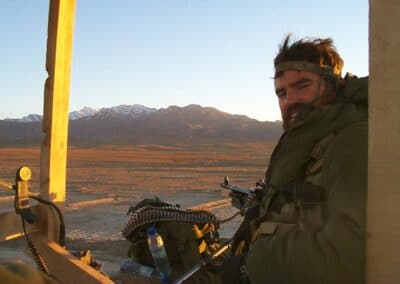
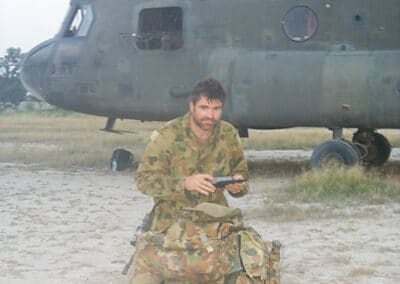
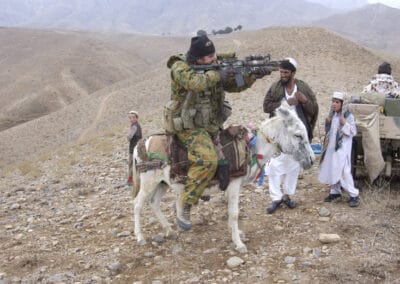




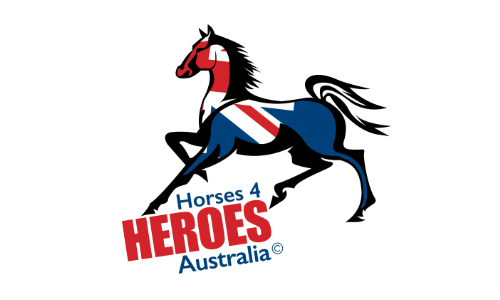
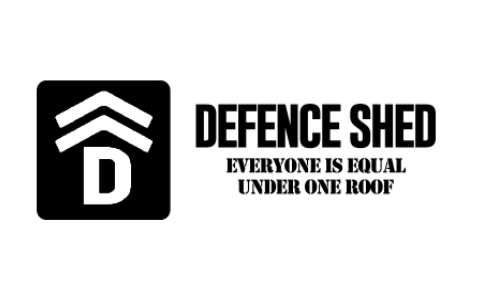
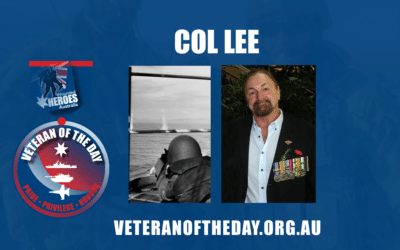
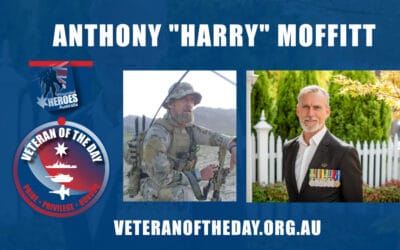
0 Comments